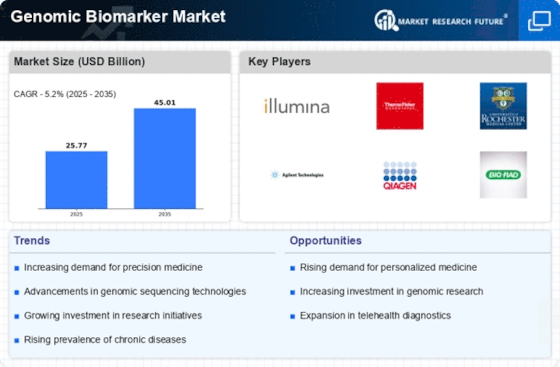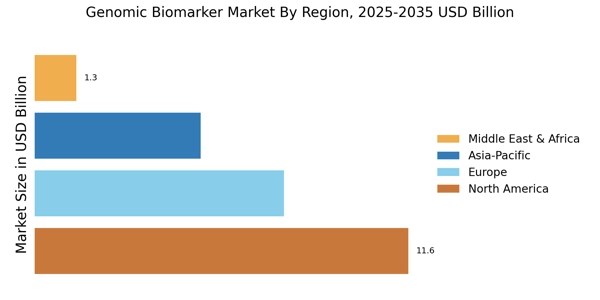Advancements in Genomic Technologies
Technological advancements in genomic sequencing and analysis are significantly influencing the Genomic Biomarker Market. Innovations such as next-generation sequencing (NGS) and CRISPR technology have revolutionized the ability to identify and validate biomarkers. These technologies enable researchers to analyze vast amounts of genetic data with unprecedented accuracy and speed. The market for genomic sequencing is expected to expand, with projections indicating a compound annual growth rate of over 20% in the coming years. As these technologies become more accessible, they are likely to enhance the discovery and application of genomic biomarkers, thereby driving growth in the Genomic Biomarker Market.
Rising Investment in Genomic Research
The surge in investment directed towards genomic research is a notable driver for the Genomic Biomarker Market. Governments, private entities, and academic institutions are increasingly allocating funds to explore the potential of genomic biomarkers in various therapeutic areas. This influx of capital is facilitating groundbreaking research and the development of novel biomarkers. Recent reports indicate that funding for genomic research has seen a significant uptick, with billions of dollars being invested annually. Such financial backing is likely to catalyze advancements in the field, ultimately contributing to the expansion of the Genomic Biomarker Market.
Growing Demand for Companion Diagnostics
The increasing focus on companion diagnostics is emerging as a significant driver for the Genomic Biomarker Market. Companion diagnostics are tests designed to determine the suitability of specific therapies for individual patients based on their genetic makeup. This trend aligns with the broader movement towards personalized medicine, where treatments are tailored to the unique genetic profiles of patients. The market for companion diagnostics is anticipated to witness substantial growth, with estimates suggesting a valuation exceeding several billion dollars in the next few years. This demand is likely to enhance the integration of genomic biomarkers into clinical practice, thereby propelling the Genomic Biomarker Market.
Increasing Prevalence of Chronic Diseases
The rising incidence of chronic diseases such as cancer, diabetes, and cardiovascular disorders is a pivotal driver for the Genomic Biomarker Market. As these conditions become more prevalent, there is an escalating demand for precise diagnostic tools and targeted therapies. According to recent estimates, the global burden of chronic diseases is projected to reach unprecedented levels, necessitating innovative solutions. Genomic biomarkers play a crucial role in identifying disease susceptibility and tailoring treatment plans, thereby enhancing patient outcomes. This trend is likely to propel investments in research and development, further stimulating growth within the Genomic Biomarker Market.
Regulatory Support for Biomarker Development
Regulatory bodies are increasingly recognizing the importance of genomic biomarkers in drug development and patient care, which serves as a crucial driver for the Genomic Biomarker Market. Initiatives aimed at streamlining the approval process for biomarker-based tests are gaining traction. For instance, the FDA has established pathways for the expedited review of companion diagnostics, thereby encouraging innovation. This regulatory support is expected to foster a conducive environment for the development and commercialization of genomic biomarkers. As a result, the Genomic Biomarker Market is likely to experience accelerated growth, driven by enhanced collaboration between regulatory agencies and industry stakeholders.

















